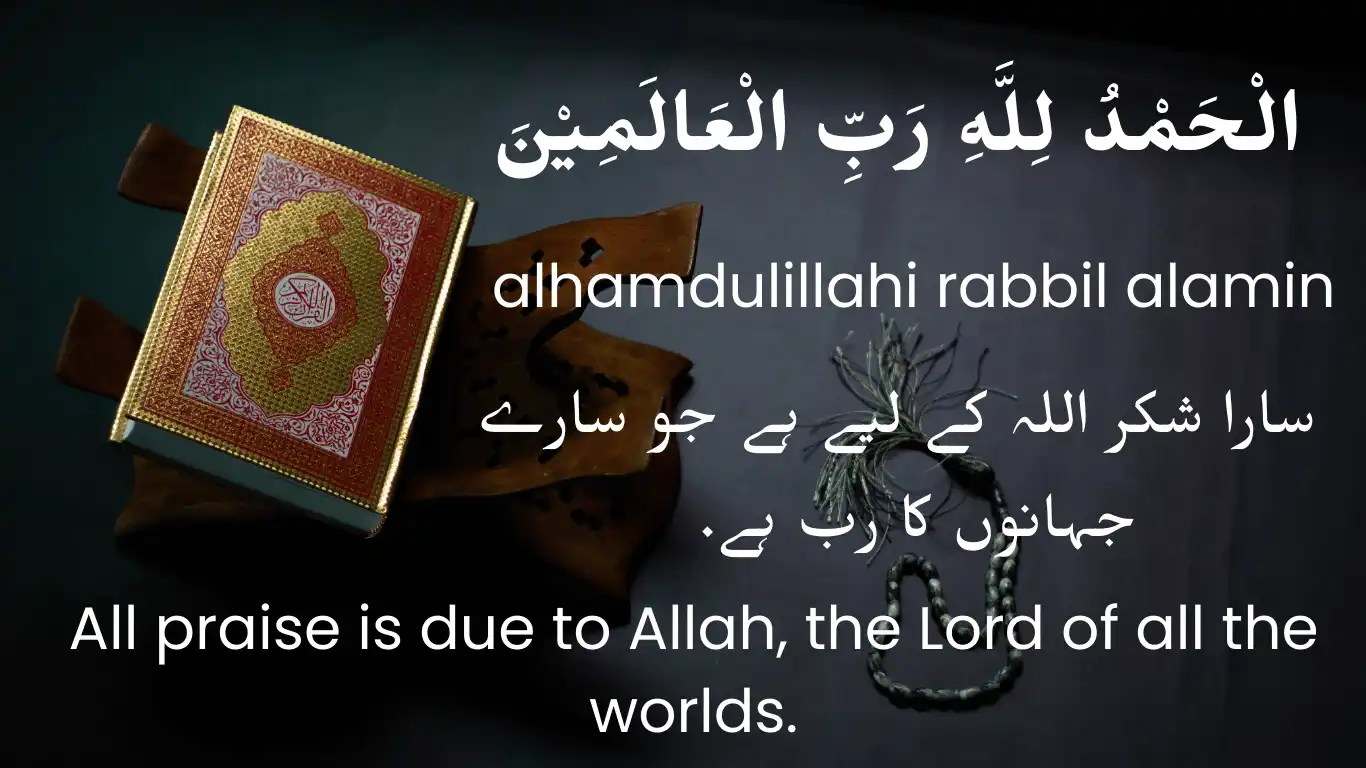Alhamdulillahi Rabbil Alamin (الحمدلله ربّ العالمِين) is a phrase that encapsulates gratitude, devotion, and reverence toward Allah. It is the opening verse of Surah Al-Fatiha, the first chapter of the Quran, and holds a central place in Islamic worship and spirituality. In this article, we will explore the profound meanings and implications of this beautiful phrase, with Arabic verses, English translations, and Urdu explanations.
| Iyyaka Na’budu Wa Iyyaka Nastaeen |
| Surah Fatiha 1st Chapter of the Quran |
| Kun Faya Kun (کُن فَیَکُوْن) Meaning in Urdu? |
| Radhitu Billahi Rabba Wabil Islami Dina |
Understanding Alhamdulillahi Rabbil Alamin
The phrase “Alhamdulillahi Rabbil Alamin” translates to “All praise is due to Allah, the Lord of all the worlds.” This verse is not only a declaration of gratitude but also a recognition of Allah’s sovereignty, mercy, and unmatched authority.
Breaking Down the Phrase
- الحمد (“Al-Hamd”)
- Meaning: Praise, gratitude, and thanks.
- Implication: It signifies complete and unconditional praise, directed solely to Allah.
- لله (“Lillah”)
- Meaning: To Allah.
- Implication: All gratitude belongs exclusively to Allah, the Creator and Sustainer.
- ربّ (“Rabb”)
- Meaning: Lord, Sustainer, and Cherisher.
- Implication: Refers to Allah’s nurturing and sustaining role for all of creation.
- العالمِين (“Al-Alamin”)
- Meaning: All the worlds.
- Implication: Includes everything in existence—the seen and unseen, humans, jinn, and all other creations.
The Context in the Quran
The phrase “Alhamdulillahi Rabbil Alamin” is found in Surah Al-Fatiha (1:2):
Arabic:
الْحَمْدُ لِلَّهِ رَبِّ الْعَالَمِيْنَ
English Translation:
“All praise is due to Allah, the Lord of all the worlds.”
Urdu Translation:
“سارا شکر اللہ کے لیے ہے جو سارے جہانوں کا رب ہے۔”
This verse establishes the foundation of a Muslim’s relationship with Allah, emphasizing gratitude and recognition of His lordship.
Lessons from الْحَمْدُ لِلَّهِ رَبِّ الْعَالَمِيْنَ
1. Gratitude as a Way of Life
- Reflection: This phrase teaches us to express gratitude not only in moments of happiness but also during trials.
- Quranic Support:“If you are grateful, I will surely increase you [in favor].” (Surah Ibrahim 14:7)
2. Acknowledging Allah’s Sovereignty
- Reflection: Recognizing Allah as the Lord of all worlds nurtures humility and submission.
- Quranic Support:“He is Allah, other than whom there is no deity, the Sovereign, the Pure, the Perfection.” (Surah Al-Hashr 59:23)
3. Unity of Creation
- Reflection: The term “Al-Alamin” reminds us of the interconnectedness of all creations under one Lord.
- Quranic Support:“And We have not created the jinn and mankind except to worship Me.” (Surah Adh-Dhariyat 51:56)
Significance in Daily Life
- In Salah: Muslims recite “الْحَمْدُ لِلَّهِ رَبِّ الْعَالَمِيْنَ” multiple times during prayers, reaffirming their devotion.
- In Gratitude Practices: It serves as a reminder to thank Allah for every blessing, big or small.
- In Spiritual Growth: Reflecting on its meaning strengthens faith and reliance on Allah.
FAQs
It means “All praise is due to Allah, the Lord of all the worlds.” It signifies gratitude and recognition of Allah’s sovereignty.
This phrase is a cornerstone of Islamic worship, reflecting gratitude, submission, and acknowledgment of Allah’s lordship over all creations.
By expressing gratitude to Allah in every situation, recognizing His blessings, and reciting this phrase in prayers and daily reflections.
Conclusion
“الْحَمْدُ لِلَّهِ رَبِّ الْعَالَمِيْنَ” is more than just a verse; it is a way of life. It teaches us to be grateful, humble, and conscious of Allah’s endless blessings and mercy. By internalizing its meanings, we can strengthen our connection with Allah and live a life of purpose and gratitude. Let us make this powerful phrase a regular part of our thoughts, words, and actions.




